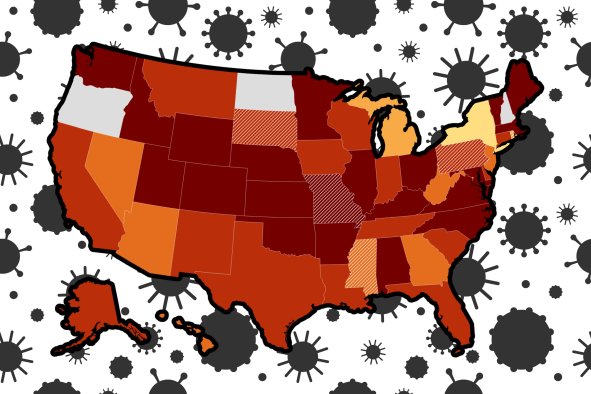Ultra-processed foods (UPFs) have been linked with type 2 diabetes risk, an English study published on Monday has found.
Analyzing the diets and health outcomes of 311,892 Europeans, researchers found that every 10 percent increase of UPF in a person's diet was associated with a 17 percent increase in diabetes risk.
And when 10 percent of the UPFs in their diet were replaced with less processed foods, it reduced diabetes risk by up to 18 percent.
Type 2 diabetes is a chronic disease that affects an estimated 11.6 percent of the U.S. population, according to the Centers for Disease Control and Prevention, and is connected with poor diet.
"We know that ultra-processed foods are associated with a higher risk of certain diseases such as type 2 diabetes," said first author Samuel Dicken, of University College London's (UCL) Division of Medicine, in a statement.
"As expected, our findings confirm this link and show that every 10 percent increase in the diet from UPF increases the risk of developing type 2 diabetes considerably."
UPFs are a category of foods that usually refers to a system developed in 2009 by Brazilian nutrition scientists, led by Carlos Monteiro, called NOVA.
The NOVA system categorizes foods into four groups by degree of processing. The first group, unprocessed or minimally processed foods, includes fresh whole foods such as vegetables, fruits, whole grains, nuts and seeds.
Second, processed culinary ingredients are kitchen ingredients someone might use to cook, such as oil, butter and vinegar.
Then there are processed foods, which include foods which have been slightly processed, perhaps by combining fresh whole foods with culinary ingredients to make a home-cooked stew, or perhaps by processing a fresh ingredient to make it last longer, such as tinned fruit or frozen vegetables.
Finally, UPFs are those which have been industrially processed for commercial sale. They contain ingredients—such as stabilizers, preservatives, thickeners, and sweeteners—that are not usually found in domestic kitchens, and they come wrapped in packaging that is decorated with branding and marketing slogans.
"UPF is a very useful tool for studying a dietary pattern," Dr. Chris van Tulleken told Newsweek. Van Tulleken is a doctor, broadcaster, and author of Ultra-Processed People who is known in the U.K. for trying to spread the word about the dangers of UPF.
"We have more evidence around a high UPF diet being harmful than any other dietary pattern," he said. "The definition developed by Carlos Monteiro's team has now been used in many hundreds of research studies.
"The power of the definition is that it is the best description of a modern diet for academic research.
"But it is not a tool for specifically labeling individual products and no one serious is saying all UPF is equally harmful."
Scientists at UCL, working in collaboration with experts from the University of Cambridge and Imperial College London, did not find that all UPFs were equally harmful.
In fact, while UPFs overall were linked with a higher risk of type 2 diabetes, analysis of nine UPF subgroups showed that some products were associated with reduced risk, including breads, breakfast cereals, desserts, and plant-based alternatives.
Meanwhile, savory snacks such as chips, animal-based products such as processed meats, ready meals and sweetened drinks were all associated with a higher incidence of type 2 diabetes.
"The UPF subgroup analysis in this study has been revealing and confirms that not all foods categorized as UPF are alike in terms of the health risks associated with them," said Professor Rachel Batterham, senior author of the study from the UCL Division of Medicine, in a statement.
"Breads and cereals, for example, are a staple of many people's diets. Based on our results, I think we should treat them differently to savory snacks or sugary drinks in terms of the dietary advice we provide."
When subjects in this study ate a lot of UPFs, it was these unhealthy foods which seemed to contribute towards overall type 2 diabetes risk.
Among the top 25 percent of UPF consumers—for whom UPFs made up an average of 23.5 percent of their total diet—artificially- or sugar-sweetened drinks made up almost two fifths of their UPF intake, and 9 percent of their diet overall.
There has been considerable debate in the nutrition world about the usefulness of the UPF category, because different foods are associated with different health effects, and there is not one single factor which seems to link UPF with negative health outcomes.
Kelly LeBlanc—a registered dietitian and director of nutrition at food and nutrition education nonprofit Oldways—told Newsweek that "not all ultra-processed foods are created equal" and avoiding processed foods "may rob individuals of overlooked yet valuable sources of nutrition."
"There are a lot of limitations and inconsistencies with [the NOVA] system to be aware of," she said.
"For example, refined grains like all-purpose flour, degermed cornmeal, and white rice—which have been processed to have their healthful bran and germ removed, thus removing a substantial portion of their nutrition—are somehow considered minimally processed, putting them in the same category as fresh broccoli, while packaged 100 percent whole-grain breads are considered ultra-processed.
"Vilifying all ultra-processed foods under all circumstances places an unnecessary stigma on families who rely on specially formulated products due to food allergies, breast milk production issues, or food insecurity."
Yet this study by UCL considered this variation in UPF as part of their analysis; Van Tulleken said: "I think it's an excellent paper."
"What these studies show is that some types of UPFs are more harmful, but they don't show that some types are harmless because UPFs products are not typically compared to their non UPF equivalent," he told Newsweek.
"The different ingredient profiles and properties [of different foods] mean that they have different health effects, and we eat them in different quantities.
"So, we can use other methods to try to ascertain which UPF is mostly harmful." These include energy density, salt, sugar and fat content, he said, adding that the vast majority of UPFs were very energy dense and contained excessive amounts of salt, sugar and fat.
"Not all UPF is equally healthy, but almost none of it is healthy," van Tulleken said.
In the UCL study, researchers analyzed data from a previous study where adults, from eight European countries were recruited in the 1990s, following up with them for an average of 10 years, during which time 14,236 participants developed type 2 diabetes.
Substitution modeling allowed the scientists to see how, theoretically, replacing one NOVA food group with another would affect type 2 diabetes risk.
The research was observational, so only associations could be found, rather than any cause-and-effect relationships.
However, Van Tulleken said: "The finding that a dietary pattern high in UPF is associated with higher risk of type 2 diabetes is likely to be causal."
And study author Professor Marc Gunter, from Imperial College London, said in a statement: "While such a study cannot determine causal relationships, it does suggest that reducing consumption of some UPF and replacing them with unprocessed, whole foods, might lower risk of type 2 diabetes.
"Further research to understand mechanisms and potential causal pathways is now needed."
The same scientists are currently conducting a trial to assess the impact of diets dominated by UPFs, compared with minimally processed foods, where both meet healthy eating guidance, to clarify the results of their study.
This study was funded by the International Agency for Research on Cancer, and some of the researchers received funding from the Medical Research Council, the National Institute for Health and Care Research, Sir Jules Thorn Charitable Trust, Rosetrees Trust, and the World Cancer Research Fund.
Some authors declared conflicts of interest with Eli Lilly, Novo Nordisk, Medscape, ViiV Healthcare, International Medical P, Pfizer, Gil Therapeutics, and Epitomee Medical.
Do you have a tip on a food story that Newsweek should be covering? Is there a nutrition concern that's worrying you? Let us know via science@newsweek.com. We can ask experts for advice, and your story could be featured in Newsweek.
Reference
Dicken, S. J., Dahm, C. C., Ibsen, D. B., Olsen, A., Tjønneland, A., Louati-Hajji, M., Cadeau, C., Marques, C., Schulze, M. B., Jannasch, F., Baldassari, I., Manfredi, L., Santucci de Magistris, M., Sánchez, M.-J., Castro-Espin, C., Rodríguez Palacios, D., Amiano, P., Guevara, M., van der Schouw, Y. T., Boer, J. M. A., Verschuren, W. M. M., Sharp, S. J., Forouhi, N. G., Wareham, N. J., Vamos, E. P., Chang, K., Vineis, P., Heath, A. K., Gunter, M. J., Nicolas, G., Weiderpass, E., Huybrechts, I., & Batterhama, R. L. (2024). Food consumption by degree of food processing and risk of type 2 diabetes mellitus: a prospective cohort analysis of the European Prospective Investigation into Cancer and Nutrition (EPIC). The Lancet Regional Health – Europe. https://doi.org/10.1016/j.lanepe.2024.101043
Disclaimer: The copyright of this article belongs to the original author. Reposting this article is solely for the purpose of information dissemination and does not constitute any investment advice. If there is any infringement, please contact us immediately. We will make corrections or deletions as necessary. Thank you.



